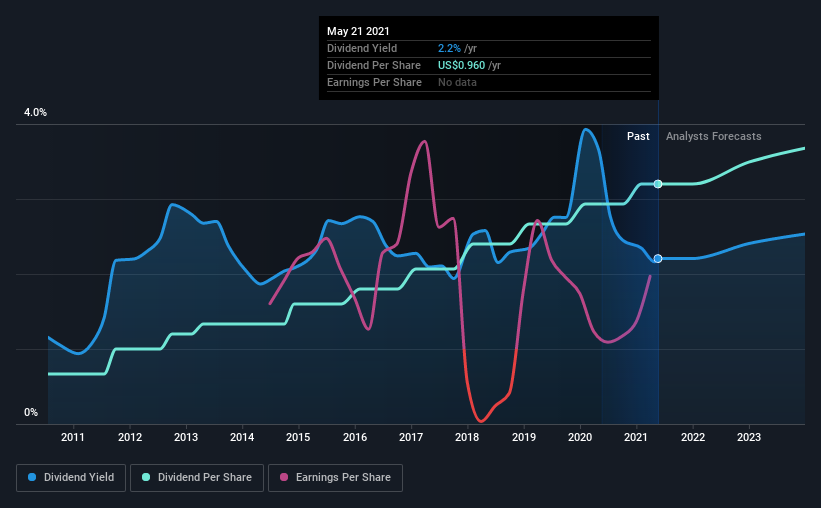Corning Incorporated (NYSE:GLW) Goes Ex-Dividend Soon
Readers hoping to buy Corning Incorporated (NYSE:GLW) for its dividend will need to make their move shortly, as the stock is about to trade ex-dividend. The ex-dividend date occurs one day before the record date which is the day on which shareholders need to be on the company's books in order to receive a dividend. It is important to be aware of the ex-dividend date because any trade on the stock needs to have been settled on or before the record date. Thus, you can purchase Corning's shares before the 27th of May in order to receive the dividend, which the company will pay on the 29th of June.
The company's next dividend payment will be US$0.24 per share, and in the last 12 months, the company paid a total of US$0.96 per share. Based on the last year's worth of payments, Corning stock has a trailing yield of around 2.2% on the current share price of $43.53. Dividends are an important source of income to many shareholders, but the health of the business is crucial to maintaining those dividends. So we need to investigate whether Corning can afford its dividend, and if the dividend could grow.
View our latest analysis for Corning
Dividends are typically paid out of company income, so if a company pays out more than it earned, its dividend is usually at a higher risk of being cut. Corning paid out 62% of its earnings to investors last year, a normal payout level for most businesses. A useful secondary check can be to evaluate whether Corning generated enough free cash flow to afford its dividend. Over the last year it paid out 51% of its free cash flow as dividends, within the usual range for most companies.
It's encouraging to see that the dividend is covered by both profit and cash flow. This generally suggests the dividend is sustainable, as long as earnings don't drop precipitously.
Click here to see the company's payout ratio, plus analyst estimates of its future dividends.
Have Earnings And Dividends Been Growing?
Companies with consistently growing earnings per share generally make the best dividend stocks, as they usually find it easier to grow dividends per share. If earnings decline and the company is forced to cut its dividend, investors could watch the value of their investment go up in smoke. This is why it's a relief to see Corning earnings per share are up 7.4% per annum over the last five years. Decent historical earnings per share growth suggests Corning has been effectively growing value for shareholders. However, it's now paying out more than half its earnings as dividends. Therefore it's unlikely that the company will be able to reinvest heavily in its business, which could presage slower growth in the future.
Another key way to measure a company's dividend prospects is by measuring its historical rate of dividend growth. In the past 10 years, Corning has increased its dividend at approximately 17% a year on average. It's encouraging to see the company lifting dividends while earnings are growing, suggesting at least some corporate interest in rewarding shareholders.
To Sum It Up
Has Corning got what it takes to maintain its dividend payments? Earnings per share have been growing modestly and Corning paid out a bit over half of its earnings and free cash flow last year. Overall, it's not a bad combination, but we feel that there are likely more attractive dividend prospects out there.
With that being said, if dividends aren't your biggest concern with Corning, you should know about the other risks facing this business. Every company has risks, and we've spotted 3 warning signs for Corning you should know about.
If you're in the market for dividend stocks, we recommend checking our list of top dividend stocks with a greater than 2% yield and an upcoming dividend.
This article by Simply Wall St is general in nature. It does not constitute a recommendation to buy or sell any stock, and does not take account of your objectives, or your financial situation. We aim to bring you long-term focused analysis driven by fundamental data. Note that our analysis may not factor in the latest price-sensitive company announcements or qualitative material. Simply Wall St has no position in any stocks mentioned.
Have feedback on this article? Concerned about the content? Get in touch with us directly. Alternatively, email editorial-team (at) simplywallst.com.

